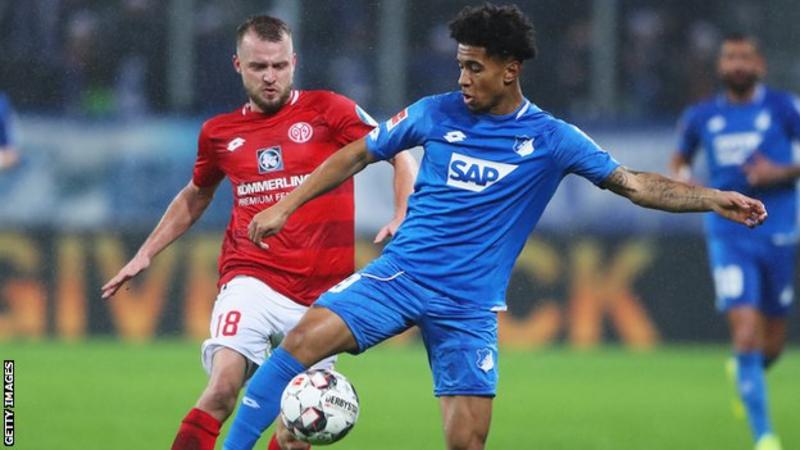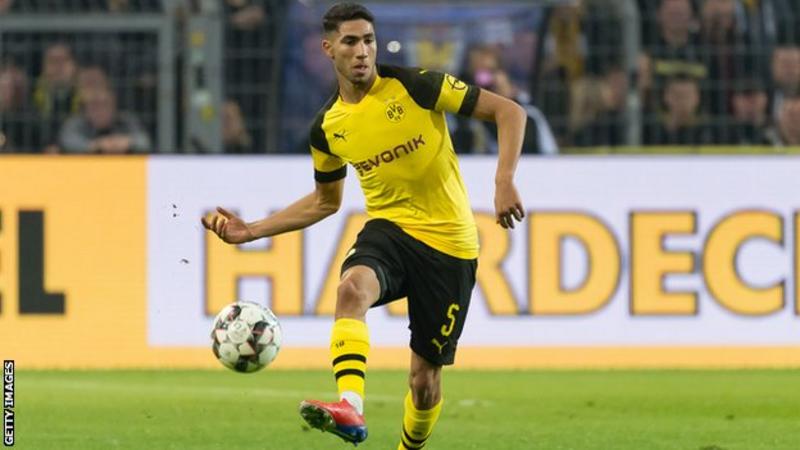
When Jadon Sancho faces Tottenham in the Champions League on Tuesday, it will provide the latest vindication of his decision to leave Manchester City for Borussia Dortmund.
Sancho has come to be viewed as something of a poster-boy for young English players moving overseas - a growing trend which has included Arsenal's Reiss Nelson impressing at Hoffenheim and Bayern Munich bidding £35m for Chelsea's Callum Hudson-Odoi.
Not only is Sancho impressing in Borussia Dortmund's first team, he is appearing regularly in the Champions League and has made his England debut. In contrast, Phil Foden - a team-mate of Sancho's and Hudson-Odoi's in England's U17 World Cup win in 2017 - remains a peripheral figure at Manchester City, often not making the matchday squad.
We spoke to two men in charge of youth development at two major European clubs about the increasing popularity of young English players.
Jochen Sauer, director of FC Bayern Campus and overseer of the youth setup at Bundesliga champions Bayern Munich: Youth development in England has improved a lot over the past five to eight years. The clubs and the federation recognised that France, Germany and other European countries were doing better. Now, if you see the academies and facilities at Tottenham or Manchester City, for example, it is a huge development.
The consequence is that players are better trained, so it is not a surprise that the quality of young players in England has increased a lot. The proof of this is the performance and results of England's young national teams from under-17 to under-20. There are outstanding talents in those age groups.
But all those big teams in the Premier League with great youth academies also have high quality and talent standards for their first team. As in every top club, it is difficult to bring those young players into the professional team.
Ernest Faber, PSV Eindhoven's head of academy: The physical power of English players is more than it is in Holland. Everybody plays with the ball here, even at lower levels or among amateurs. Now, in England, it is the same. They come to our site to look around, they go to Germany, to Spain. The sharing of knowledge is improving everyone. And you also have the money in England.

Reiss Nelson struggled for game time at Arsenal but has made 22 appearances for Hoffenheim this season
Sauer: Getting young players into the first team is not just a problem for England and the Premier League - it is the same challenge for Bayern Munich.
For other teams in Germany - like Borussia Monchengladbach, who had Andreas Christensen on loan from Chelsea and Reece Oxford from West Ham, or Hoffenheim with Reiss Nelson - they can really benefit from English talents. They can offer those players what top teams like Chelsea or Manchester City cannot: playing time.
If you see the level of competition at the top teams in Europe, it is unrealistic to think a talent can just go to the first team and play. Unless it is a "Jahrhunderttalent" (a once-in-a-generation talent), this is impossible at Bayern Munich, it is impossible at Chelsea and it is impossible at Manchester City.
Those clubs want to win the domestic league or the Champions League. They only have 22 first-team spots and the quality of the team is exceptionally high. It is our job to find solutions and to give these young talents playing time at the highest possible level.
Faber: My under-17s play in the second division in Holland. At 19, those players are in the first team. This is the philosophy of Holland. Our competition is great for young players. You get experience playing under pressure, playing for the title, playing European football.
We like to create good surroundings for young players to get used to the pressure, the press, everything. We have a 16-year-old at the moment who trains with the first team. Our football helps that. We always like to attack, we always like to play open. We give space for them to develop.
The Premier League is the highest level, then you have a gap. We are between that gap. Our steps in developing young players are smaller. It is easier for a young player to make those steps.
It is great for players from England to come to our country because we have so many players who are the same age and they can share their feelings. They think the same. They speak English and Spanish. Together they can go to a higher level because they get more time to develop.
There is pressure in the Premier League. It is about power, speed, big money. In Holland the pressure is a bit less and we look more on the development side. Those are the surroundings we create at PSV, but it is also the case at Ajax and Feyernoord.
Sauer: I think every young player from abroad would need adaptation time at Bayern Munich. Look at the development of Sancho at Dortmund - he didn't come over and play for the first team right away. It was a year of adaptation with games for the under-19 and under-23 teams.
The club knew that Sancho was a big talent but they also knew he wasn't ready for the first team from the first day. It is difficult to be ready for the first team if you are only playing under-19s.
I watched Sancho the year before he joined Dortmund against Red Bull Salzburg, in the Uefa Youth League. They beat Manchester City. Sancho played in this game and you could see that he was better than some of his team-mates, but they lost the game and he was not better than some players from the Salzburg team.
He went to Dortmund and needed a year of adaptation, of getting the chance to train with the professional team, adapting and learning what is different about being in a men's professional team.
Now with Lucien Favre, he has a coach who always tries to integrate young players. A lot depends on the first-team manager. Favre is putting Sancho in, but also Jacob Bruun Larsen and Achraf Hakimi. He trusts all those young players and likes to work with them.
At Tottenham, Mauricio Pochettino is also integrating young players and gets the trust and support from the club management. Dortmund and Tottenham are doing very well in the league but it is much more difficult in a big club like Chelsea, Barcelona or Bayern Munich.

Achraf Hakimi is on loan at Dortmund from Real Madrid and, like Sancho, has impressed under Lucien Favre
Sauer: We have around 220 players in our academy, 20 or 30 of whom have to come from outside our local area, either from the rest of Germany or other countries.
This aspect hasn't changed over the years. What has really changed is the money that is now in the youth sector in England and, as a consequence, Europe.
Five or six years ago we knew that it was very difficult to compete with English clubs on a professional level because they are able to spend more money than the German clubs. Now we are facing the same situation in youth football.
If we have identified a talent and offer him a contract, what I offer him monthly, some English clubs can offer weekly. This makes it really difficult financially to recruit players from England, or to compete with an English club for a French, Dutch or Belgian talent.
Over the past 15 years, the Bayern management hired quality players for less money than other clubs. If I am lucky and identify a talent, and no English club is there, I have a realistic chance to get him. As soon as there are two or three English clubs, less chance. Even a club like Fulham or Everton can afford more than Bayern Munich in the youth sector.